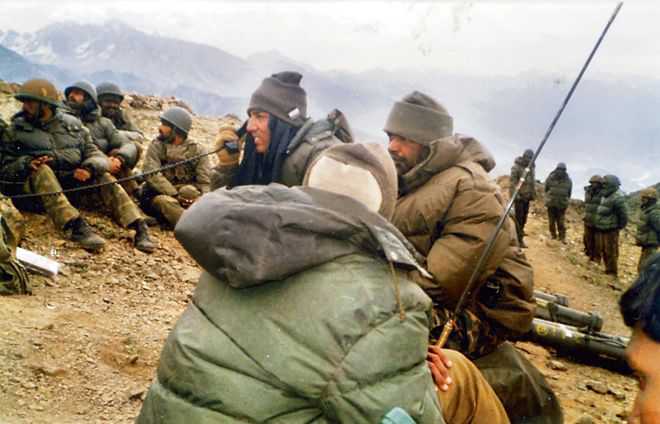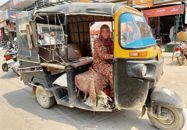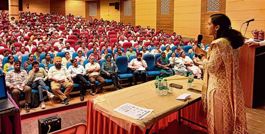
Inevitable? Sexual violence against women during conflicts is as old as warfare.
Bharat H Desai, Balraj K Sidhu
Bharat H Desai
Professor, JNU
Balraj K Sidhu
Faculty, IIT, Kharagpur
If we want people to say 'no more war', we have to show how brutal it is," ringed the voice of Berit Reiss-Andersen, Chair of the Norwegian Nobel Committee, while announcing the winners of the 2018 Nobel Peace Prize. Congolese doctor Denis Mukwege and Yezidi victim of IS brutality in Iraq Nadia Murad were jointly conferred with the Nobel honour for their efforts to end the use of sexual violence as a weapon in armed conflicts. Both have made a crucial contribution to focus attention on, and combating, such war crimes.
Sexual violence and crimes committed against women during conflicts are as old as the history of warfare. It is still being used as a tactic and weapon of war. In fact, it is not just rape out of control, but rape under orders, as a means of pursuing military, political or economic ends. The horrors of Pakistani army's effort to crush the 1971 Bangladeshi liberation movement are etched in collective memory with the systematic rape of hundreds of thousands Bengali women. Sri Lanka is trying to come to terms with the aftermath of brutal violence by both the security forces and the LTTE.
The use of sexual violence in conflict zones as well as acceptance of such incidents, brutalities and resultant trauma generally result in 'walls of silence'. Hence, it has been often brushed aside as an inevitable and unavoidable 'evil' consequence of war. This has been aggravated by pre-existing exclusions and discriminations that typify women's status in most societies.
A neglected crime
Wars often leave behind gory incidents, horrid stories, a painful past and many wounds that refuse to heal with time. One such simmering issue arose before World War II wherein the Japanese military set up comfort stations treating women as sex slaves. These women slaves were drawn from the vast Japanese empire, of which Korean women constituted the bulk. In December 2015, Japan and South Korea brokered a deal wherein Japan issued a "most sincere" apology and paid $8.3 million to the surviving victims. However, this was revoked recently, with the change of government in South Korea. It shows how wounds of the past refuse to heal.
At the 68th UN General Assembly Session (2014), 122 Member-States endorsed a Declaration of Commitment to End Sexual Violence in Conflict. The Declaration resolved to end the pernicious culture of impunity by bringing to justice perpetrators of sexual violence in conflict. A process for concerted action against sexual violence during armed conflicts took shape in the wake of the UN Security Council Resolutions 1325 (2000) and 1820 (2008) as well as incorporation of crimes of sexual violence in the statutes of International Criminal Tribunals (Yugoslavia, Rwanda, Sierra Leone) and the International Criminal Court (ICC). The Rome Statute of ICC became the first global treaty that recognises rape, sexual slavery, enforced prostitution, forced pregnancy, enforced sterilisation, and other forms of sexual violence as distinct types of war crimes.
The tribunals, however, have a limited capacity to provide justice to sufferings inflicted upon women during conflicts. They recognise a small set of the crimes committed against women and fall short of addressing all gender-based harms and curing gender biases entrenched in society as well as institutions. The conviction rate in cases before the International Criminal Tribunal for Rwanda does not reflect the high levels of gender violence during the Rwandan genocide, although records indicate that rape and sexual violence formed part of the systematic attack on the civilians. On the other hand, in all cases before the International Criminal Tribunal for Yugoslavia, till April 2011, 93 individuals were indicted: 44 of them for crimes involving sexual violence. Of those 44 individuals, 29 were convicted of sexual violence.
The Sierra Leone civil war also gave birth to notorious tradition of 'bush wife' in which captured or abducted civilian girls and women were forcibly assigned to rebel commanders. At the same time, an investigation into sexual crimes presents its own specific challenges that include the under- or non-reporting of sexual violence owing to societal, cultural, or religious factors; stigma for victims of sexual and gender-based crimes; limited domestic investigations and associated lack of readily available evidence; lack of forensic or other documentary evidence owing, inter alia, to the passage of time; and inadequate or limited support services at the national level. As a result, there is a tendency to dismiss sexual violence merely as an inevitable by-product of war, the random acts of a few renegades, or mere collateral damage!
The right to heal
There has been a persistent search for appropriate institutional designs that could deal with mass atrocities in conflict-ridden societies and foster justice in the post-conflict period. In recent years, the dominant discourses are led by scholars who call for Transitional Justice (TJ). It refers to the process of dealing with the aftermath of violent conflicts and systematic human rights abuses in order to provide conditions for a peaceful future.
In the thick of the post-war accountability jamboree, the struggle to ensure justice for women victims is aggravated by the 'walls of silence' that often contain bricks of shame, stigma, fear and futility. In the legal and political maze of ending or transmuting conflict, women still need to struggle to insulate and influence policies, laws and institutional structures that adversely affect them.
Need for post-conflict justice
The large-scale violence resulting from the 1947 partition of India left unspeakable atrocities against women. Women on both sides of the border (India and Pakistan) suffered brutalities caused by the deadly combination of religion and anger of retribution. They were abducted, killed, maimed, mutilated, violated and abandoned. Even after an agreement between India and Pakistan to return women to their original families, there were no takers of them. No one came to reclaim them. Many of them were forced into prostitution. Amid jubilation over freedom, these victim-survivors did not figure anywhere in the historical records. No effort was made to redress the injustices done against them.
Lack of empathy to understand the multi-dimensional nature of the suffering of women confronts us as they struggle to survive violent conflicts. The overwhelming emphasis on sexual and penetrative violations of women's bodies' has led to insensitivity towards emotional harm, harm to the homes, personal spaces, to children and to others with whom women are intimately connected.
Sexual violence against women during conflicts remains one of the biggest challenges of this century. One only hopes that the 2018 Nobel Peace Prize will give a push for concrete inter-governmental action for designing a special global treaty to hold states and non-state actors responsible as well as provide pre-emptive measures to end sexual violence against women during violent conflicts.



























